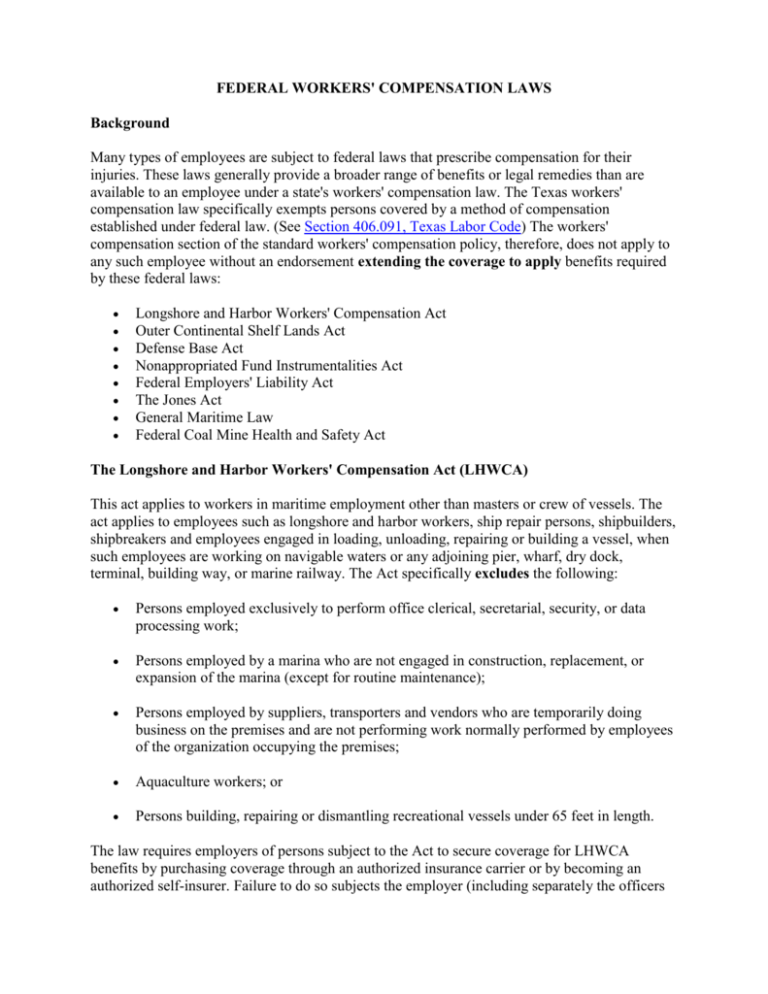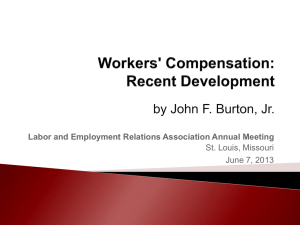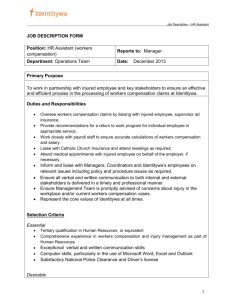
FEDERAL WORKERS' COMPENSATION LAWS
Background
Many types of employees are subject to federal laws that prescribe compensation for their
injuries. These laws generally provide a broader range of benefits or legal remedies than are
available to an employee under a state's workers' compensation law. The Texas workers'
compensation law specifically exempts persons covered by a method of compensation
established under federal law. (See Section 406.091, Texas Labor Code) The workers'
compensation section of the standard workers' compensation policy, therefore, does not apply to
any such employee without an endorsement extending the coverage to apply benefits required
by these federal laws:
Longshore and Harbor Workers' Compensation Act
Outer Continental Shelf Lands Act
Defense Base Act
Nonappropriated Fund Instrumentalities Act
Federal Employers' Liability Act
The Jones Act
General Maritime Law
Federal Coal Mine Health and Safety Act
The Longshore and Harbor Workers' Compensation Act (LHWCA)
This act applies to workers in maritime employment other than masters or crew of vessels. The
act applies to employees such as longshore and harbor workers, ship repair persons, shipbuilders,
shipbreakers and employees engaged in loading, unloading, repairing or building a vessel, when
such employees are working on navigable waters or any adjoining pier, wharf, dry dock,
terminal, building way, or marine railway. The Act specifically excludes the following:
Persons employed exclusively to perform office clerical, secretarial, security, or data
processing work;
Persons employed by a marina who are not engaged in construction, replacement, or
expansion of the marina (except for routine maintenance);
Persons employed by suppliers, transporters and vendors who are temporarily doing
business on the premises and are not performing work normally performed by employees
of the organization occupying the premises;
Aquaculture workers; or
Persons building, repairing or dismantling recreational vessels under 65 feet in length.
The law requires employers of persons subject to the Act to secure coverage for LHWCA
benefits by purchasing coverage through an authorized insurance carrier or by becoming an
authorized self-insurer. Failure to do so subjects the employer (including separately the officers
of a corporation) to a fine of up to $10,000 or imprisonment. The employer and officers of a
corporation are also personally liable for any compensation due an injured employee under the
act.
LHWCA coverage is secured on workers' compensation policies by attaching endorsement WC
00 01 06A. If coverage is obtained on a policy written through TMIC, the endorsement provides
coverage only for Texas employees subject to the Act at any location. The TMIC endorsement
does not apply to employees whose employment is not principally located in Texas or who have
no significant contacts with Texas.
Employers with no known exposure, but with operations on or near navigable bodies of water,
should attach the endorsement as a precautionary measure. Many insurance companies are
willing to do this on an "if any" basis, subject to audit.
Outer Continental Shelf Lands Act
This law provides for payment of LHWCA benefits to workers injured or killed while involved
in the exploration for and development of natural resources (oil and gas) on fixed structures
permanently attached to the Outer Continental Shelf (OCS). The OCS is generally defined as
submerged lands lying beyond the coastal states' territorial boundaries (10 miles for Texas and
Florida, 3 miles for other states).
OCS coverage is secured on the workers' compensation policy by attaching endorsement WC 00
01 09A. The endorsement requires designation of the state whose boundaries, if extended to the
Outer Continental Shelf, would include the location of the work. Therefore, the designation
should include as many states as possible if the employees work on fixed platforms offshore
from several state boundaries. If coverage is obtained on a policy written through Texas Mutual
Insurance Co., the endorsement provides coverage only to employees whose employment is
principally located in Texas or who have significant contacts with Texas.
Workers on fixed platforms within the state's territorial limitation are generally subject to the
state workers' compensation law, but some employees may fall under the LHWCA by definition.
Employees assigned to work on platforms which are not fixed may require maritime coverage.
Many offshore platforms are actually jack-up barges or tethered submersible rigs which may
qualify as a vessel with a crew. Maritime coverage must be provided for these employees.
Defense Base Act
This law provides for payment of LHWCA benefits to civilian employees of contractors who are
injured or killed while performing work at overseas military bases, whether in a territory or
possession of the U.S. or in a foreign country. Coverage also applies to workers on various
public works contracts performed outside the continental United States. Coverage is secured on
the workers' compensation policy by attaching endorsement WC 00 01 01A.
Article available at www.iiat.org (InfoCentral)
2
Nonappropriated Fund Instrumentalities Act
This act provides for payment of LHWCA benefits to civilian employees under the jurisdiction
of the armed forces and involved in the pleasure and improvement of Armed Forces' personnel,
including employees of the Army and Air Force Exchange Service, Army and Air Force Motion
Picture Service, Navy, Marine and Coast Guard Exchanges, and Navy Ship Stores. Coverage is
secured on the workers' compensation policy by attaching endorsement WC 00 01 08A.
Federal Employers' Liability Act (FELA)
This law makes an interstate railroad liable for bodily injuries sustained by an employee as a
result of the employers' negligence. The employers' liability section of the standard workers'
compensation policy excludes this exposure. Special coverage and limit of liability provisions
apply when endorsement WC 00 01 04 is attached to the standard policy.
The Jones Act
Also known as the Merchant Marine Act, this law and General Maritime Law apply to injuries to
or death of masters and crew of vessels involved in commerce on navigable bodies of water. The
Jones Act applies the Federal Employers' Liability Act to these employees and requires the
employee to prove negligence on the part of the employer or its employees or agents. The
General Maritime Law (common law of the sea) recognizes the vessel owner's duty to provide a
"seaworthy" vessel. A seaman injured because of a ship's alleged unseaworthiness may bring suit
against the vessel itself (an "in rem" suit) in addition to any negligence claim under the Jones
Act. Claims under these maritime employment compensation laws are excluded under the
standard workers' compensation policy. When coverage is desired, special coverage provisions
for the employers' liability section of the standard policy are secured by attaching endorsement
WC 00 02 01A. If coverage is obtained on a policy written through Texas Mutual Insurance Co.,
the endorsement provides coverage only to employees whose employment is principally located
in Texas or who have significant contacts with Texas.
Federal Coal Mine Health and Safety Act
This law provides for compensation of coal miners that have contracted black lung disease.
Coverage is secured under the standard workers' compensation policy by attaching endorsement
WC 00 01 02.
For a very detailed and technical analysis of the Longshore and Harbor Worker's Act and other
federal extensions, see the U.S. Department of Labor, Office of Administrative Law Judges'
Library.
Worthwhile reading on this subject: From IRMI: A Review of the Longshore and Harbor
Workers Compensation Act
Copyright © 2001 - 2002, Independent Insurance Agents of Texas. All rights reserved.
E-mail Webmaster@iiat.org to comment on this material.
Article available at www.iiat.org (InfoCentral)
3






